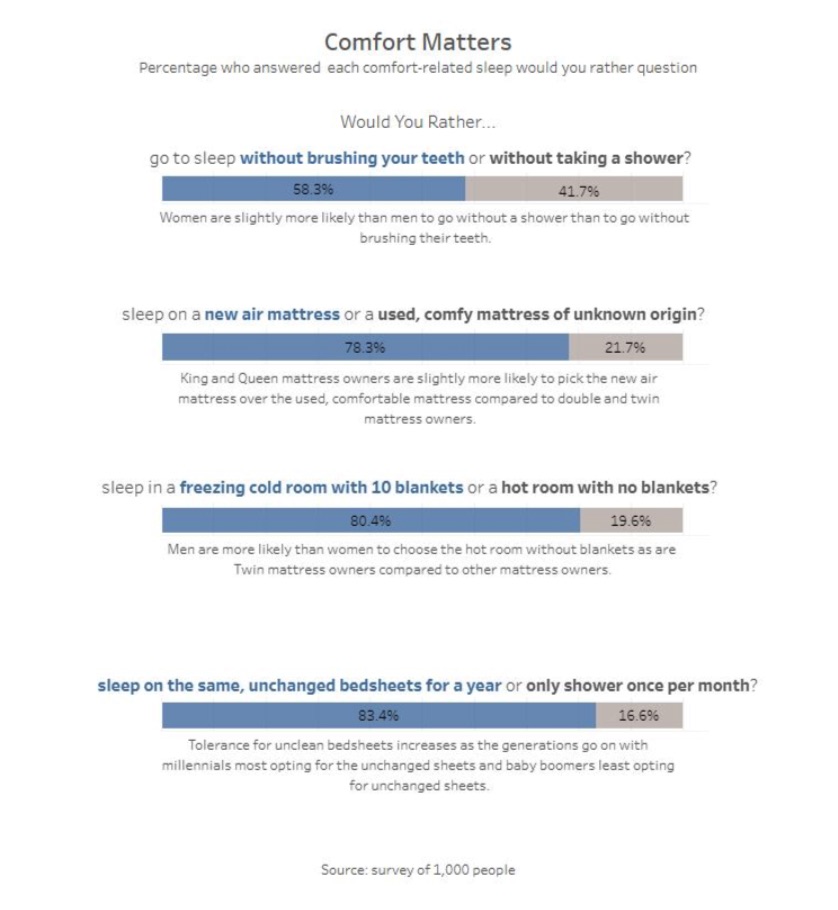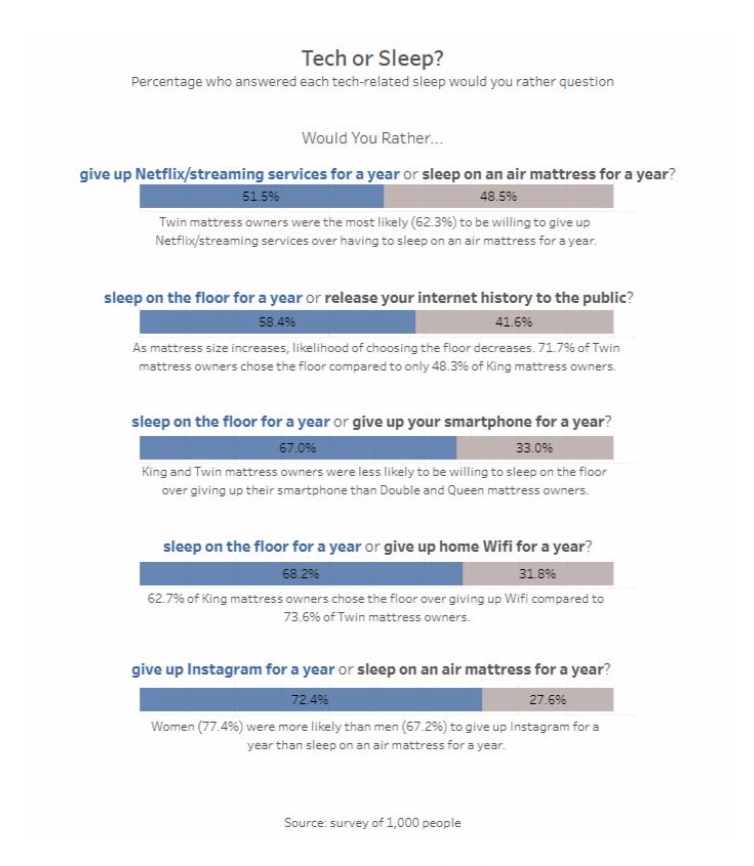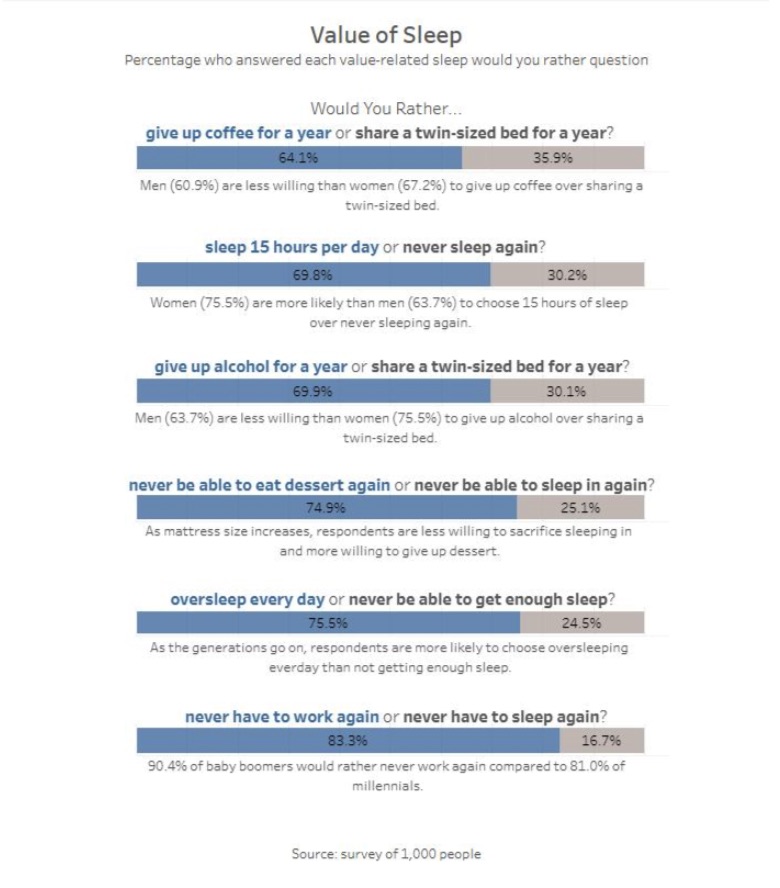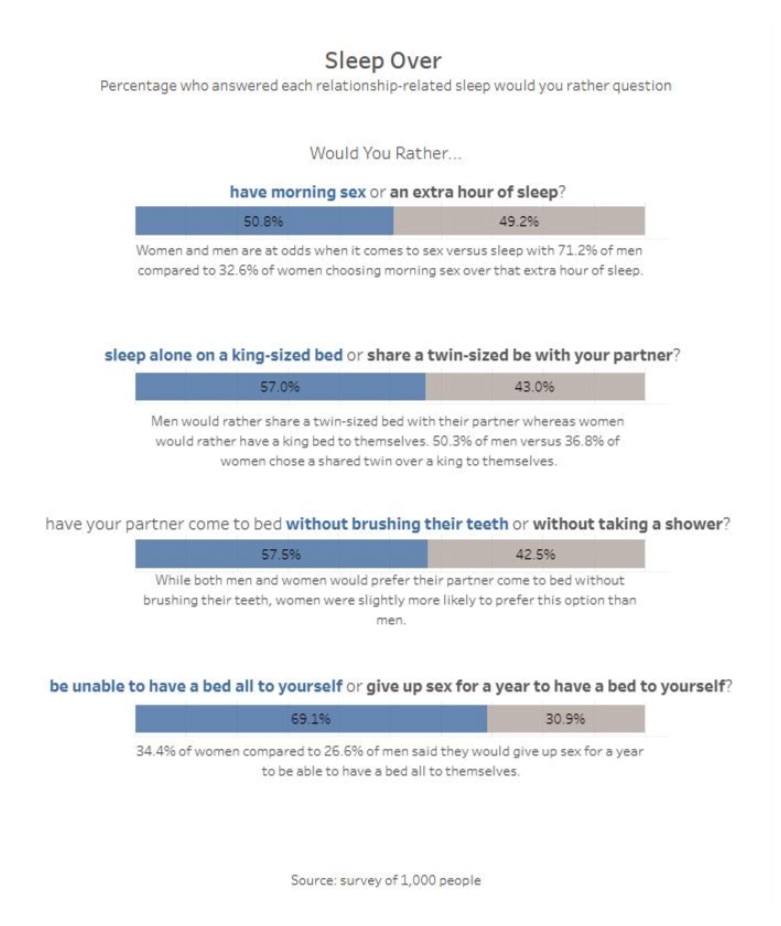How Much Is Sleep Worth? Would You Rather, Sleep Edition!
Exploring What People Would Do for Sleep and Comfort
Thanks to the current crisis, we’re all spending more time at home than we ever have before. As a result, we’re spending more time in our beds, too, whether we’re using them to work, sleep, or engage in other bed-related activities (experts have dismissed the idea of a coronavirus baby boom, but a sex boom is definitely happening).
With all this time we’re spending in our beds, it got us thinking… How important is sleep to us, really? What would we be willing to give up in exchange for a more or less comfortable sleep experience?
In that spirit, we invited 1,000 Americans to a game of “Would You Rather” Sleep Edition. Their answers reveal how much Americans value their beds and quality sleep, as well as some interesting mattress preferences among men and women.
Read on to find out how much sleep is worth to Americans, and survey your friends to see how you stack up!
Sleep Environment: Cold, Hot, Clean, or Dirty?
The ideal sleep environment is one that’s cool, dark, and quiet. Of course, the ideal doesn’t always reflect reality. Many of us sleep in bedrooms that are warmer, brighter, and louder than we’d like.
People can find ways to block out the noise (heck, some people find it easier to sleep with a bit of white noise), and others have no problem falling asleep with the lights on. When it comes to temperature, though, it’s a whole different story.
When It Comes to Sleep, Cold Beats the Heat
If you had to, would you rather sleep in a freezing cold room with ten blankets, or a hot room with no blankets? If you prefer the former, you’re not alone. 80.4 percent of people would rather sleep in the cold room.
Only one in five people would rather have the hot room without blankets. Men were more likely to choose the hot room, as were Twin mattress owners.

Clean Bodies Trump Clean Sheets, and a Clean Bed Beats a Comfy One
Showers and brushing our teeth are two common bedtime rituals, but if we had to give up one, 58.3 percent of us would prefer it to be brushing our teeth. Only 41.7 percent of people say they’d rather skip a shower than skip brushing their teeth, with women being slightly more likely to agree.
However, that all changed when we raised the stakes. If people had to choose between showering only once per month or sleeping on the same, unchanged bedsheets for a year, the vast majority (83.4 percent) chose to keep their regular shower schedule.
The tolerance for unclean bed sheets revealed an intriguing generational divide. With each new generation, this tolerance increased, with millennials being significantly more comfortable with unchanged sheets than their baby boomer parents. Overall, though, most people would much rather be stuck with unchanged bedsheets than be forced to shower only once per month.
We’d rather have clean bodies than clean sheets. When it comes to our mattress, however, cleanliness wins out over comfort. Forced to choose between sleeping on a new air mattress vs. a used, comfy mattress of unknown origin, 78.3 percent of people chose the new air mattress. The fear of bed bugs is real.
King and Queen mattress owners were slightly more likely to pick the new air mattress than Twin and Double mattress owners. Whether this says something about wealth and mattress preference, or the amount of comfort provided by a smaller mattress, we’ll leave it to you to decide.
Would You Rather Give Up Your Tech, or the Comfort of Your Sleep?
Most would agree that sleeping on the floor or an air mattress night after night is not their idea of a comfortable night’s sleep. But would they rather do that, or give up their phone, internet, or social media for a year? We asked respondents to find out.

Internet Access and Privacy Valued Above a Comfortable Mattress
Overall, people were more willing to sleep on the floor or an air mattress for a year than give up their smartphone or home Wi-Fi. These preferences reflect the way being connected, whether via home internet or a smartphone, has become essential to everyday society. Being comfortable while you sleep is nice, but it’s not a dealbreaker.
Our respondents also valued privacy over a comfortable bed, with 58.4 percent preferring to sleep on the floor than have their internet history released to the public.
In almost all cases, the tolerance for sleeping on the floor decreased with mattress size. For example, those who had King mattresses were significantly less willing to sleep on the floor than Twin mattress owners. 71.7 percent of Twin mattress owners would rather release their internet history to the public than sleep on the floor, compared with only 48.3 percent of King mattress owners. Similarly, 73.6 percent of Twin mattress owners would rather give up their home Wi-Fi for a year than sleep on the floor, compared with only 62.7 percent of King mattress owners.
There could be several factors influencing these responses. King mattress owners may be wealthier than Twin mattress owners, and less comfortable with sleeping on the floor or a cheap air mattress. They’re also more likely to purchase a larger mattress specifically for comfort, as Queen beds are typically sufficiently sized to fit two people, but a King is more spacious. Finally, King mattress owners are more likely to be older than Twin mattress owners, and older generations may prioritize comfort over being connected to the internet.
Social Media, Streaming, or Sleep? Sleep Wins
Of our Would You Rather questions, there were only two services people were willing to forego for a year in favor of sleeping on something more comfortable. These included Instagram and Netflix.
72.4 percent of people would rather give up Instagram for a year than sleep on an air mattress. At 77.4 percent, women were more likely than men (67.2 percent) to make that call. Perhaps this decision was based on an awareness of how social media can negatively impact sleep, or it was simple as prioritizing comfort over social media.
As for Netflix, the results were nearly split, with comfort just barely beating out streaming services. 51.5 percent of people opted to give up streaming services for a year, compared with 48.5 percent who would rather sleep on an air mattress. Twin mattress owners were the most likely to give up Netflix. Again, this is good to hear, as binging on Netflix can seriously mess with the quality of your sleep.
What Would You Give Up for Better Sleep?
How much do we love sleep? More than caffeine? More than dessert? If you had to choose, would you rather give up sleep or miss out on some of life’s little pleasures? Across the board, our respondents voted in favor of sleep.

Coffee and Cocktails, or a Bigger Bed? Men and Women Disagree
We gave respondents two choices: would they rather share a twin-sized bed for a year, or give up coffee or alcohol? In both instances, people would rather forego coffee or alcohol for a year, then be forced to share a twin-sized bed. Apparently, we like having our space when we sleep!
But, we don’t value it equally. Men were more likely (39.1 percent) than women (32.8 percent) to choose sharing a twin-sized bed over giving up coffee. Does this mean men prefer to cuddle more than women, or are they simply less willing to part with their daily cup of joe?
The gender differences persisted when we asked about alcohol. While more people overall would rather give up alcohol than they would coffee (69.9 percent vs. 64.1 percent), men expressed an even stronger preference to share a twin-sized bed than give up drinking. 75.5 percent of women opted to give up alcohol over sharing a twin-sized bed, compared with only 63.7 percent of men.
Let’s move on from libations to dessert. When asked if they would rather never be able to eat dessert or never sleep in, three in four people chose to give up dessert. The larger their mattress size, the stronger their preference for giving up dessert. Perhaps they should rename the Better Than Sex cake to Better Than Sleep!
Who Cares About FOMO When You’re Well-Rested?
There’s a famous saying: “I’ll sleep when I’m dead.” Whoever said it, our respondents think they had the wrong idea. 69.8 percent of them would rather sleep 15 hours per day than never sleep again. At 75.5 percent vs. 63.7 percent, women were much more likely than men to choose sleeping 15 hours over no sleep at all.
Likewise, three-quarters of people would rather oversleep every day than never be able to get enough sleep. The majority of us would rather have a bit of FOMO than experience the lack of focus, emotional haywire, and general grumpiness brought on by sleep deprivation!
As we age, our appreciation of sleep only grows. The older our respondents were, the more likely they were to choose oversleeping every day than not getting enough sleep.
The One Thing We’d Be Willing to Give Up Sleep For
From coffee to cocktails, there’s a lot we would be willing to give up to sleep more. There is one thing we would be happy to never sleep again for, though, if we could get it: never having to work again. 83.3 percent of people would rather never work again than never sleep again. Workaholics we are not.
Sleep or Sex? It Depends On Who You’re Asking
When it comes to the question of which is better — sleep or sex — it appears that men and women have two very different answers.
If forced to choose, women valued having a bigger bed, an extra hour of sleep, and having a bed all to themselves much more so than men. Men, on the other hand, were more willing to forego an extra hour of sleep, a bigger bed, or a bed all to themselves, if it meant they could have more sex.

Sleep In, or Start the Day Off With Sex?
When we asked respondents if they would rather have morning sex or an extra hour of sleep, their answers seemed split right down the middle. But then we looked at the gender data. 71.2 percent of men would choose morning sex over an extra hour of sleep, compared with only 32.6 percent of women.
Perhaps this has something to do with their nighttime hygiene habits. If they had to choose, more people (57.5 percent) of people would prefer their partner come to bed without brushing their teeth than without taking a shower.
Women expressed a stronger preference for this than men. It’s unclear whether skipping brushing your teeth feels more socially acceptable, or if bad B.O. stinks up a bedroom more than bad breath.
Women Value Space When They Sleep
When it comes to their relationship, more people would rather sleep alone than with their partner, if it meant they could have more space. 57 percent of people would rather have a king-sized bed all to themselves than be stuck sharing a twin-sized bed with their partner.
We touched on men’s apparent preference for cuddling above. They doubled down on their answers here, with 50.3 percent of men choosing to share a twin-sized bed vs. only 36.8 percent of women.
As much as people valued having space when they sleep, if they had to choose between having more space or more sex, sex wins. 69.1 percent of people would rather share their bed than give up sex for a year in order to have their own bed. Although, at 34.4 percent vs. 26.6 percent, women were again more willing than men to give up sex for a year in order to have a bed to themselves.
What You Sleep On Matters...
We had a feeling the type of mattress you owned might impact what you would, and wouldn’t, be willing to trade for sleeping on it. So, we got started by asking respondents about their mattresses. How long do people keep their mattresses, and what are the most popular types of mattresses?

The most popular mattress size among our respondents was a Queen-size mattress. This was no surprise, given that it’s the most common mattress size purchased. At 45.7 percent, nearly half of our respondents had a Queen mattress. The next most popular mattress size was a King, at 23.4 percent, followed by Double/Full mattresses (17.0 percent), Twin mattresses (10.5 percent), and California Kings (3.4 percent).
As for the most popular type of mattress, it was a tie. If you own a memory foam or innerspring mattress, consider yourself in good company. These two tied for the most popular mattress, reflecting a trend that memory foam mattresses have been gaining on the traditional innerspring for the top spot for some time now. Since their introduction just a few decades ago, memory foam beds have quickly gained favor with consumers for their superior pressure relief and conforming body-hugging sensation.
Less popular mattress choices included hybrid mattresses (19.9 percent), latex mattresses (19.5 percent), and airbeds (1.9 percent).
All of our respondents had owned their mattress for a healthy number of years, with 4.8 years being the average. This is certainly long enough to break in a mattress, but well within the lifespan of an average mattress. Depending on quality, the average mattress starts to sag within 6 to 9 years.
When it comes to replacing their mattress, the majority (92.1 percent) of people preferred to purchase a brand new mattress vs. an old one.
Our Methodology
We surveyed 1,009 Americans using Amazon’s Mechanical Turk about different scenarios related to sleep and comfort. Respondents were given predetermined options to choose between in each scenario.
The average age of our respondents was 37.9 with a standard deviation of 12.4. The generational breakdown of our respondents was as follows:
- The Greatest Generation: 3
- The Silent Generation: 4
- Baby Boomer: 135
- Generation X: 281
- Millennial: 552
- Generation Z: 34
52.5 percent (n=530) of respondents identified as female, 46.8 percent (n=473) identified as male, and fewer than 1 percent (n=3) did not identify as either.
It’s important to note that all of the data was self-reported. As a result, it’s subject to the typical biases and limitations inherent with self-reported data, such as selective memory, inaccurate estimation, and over- or under-exaggeration.